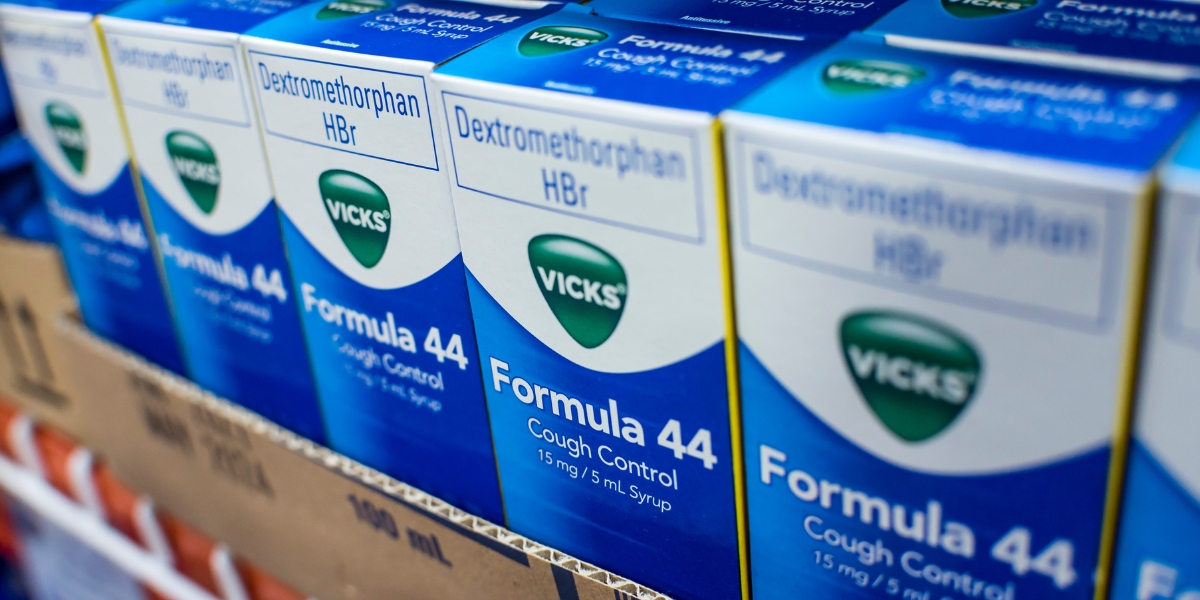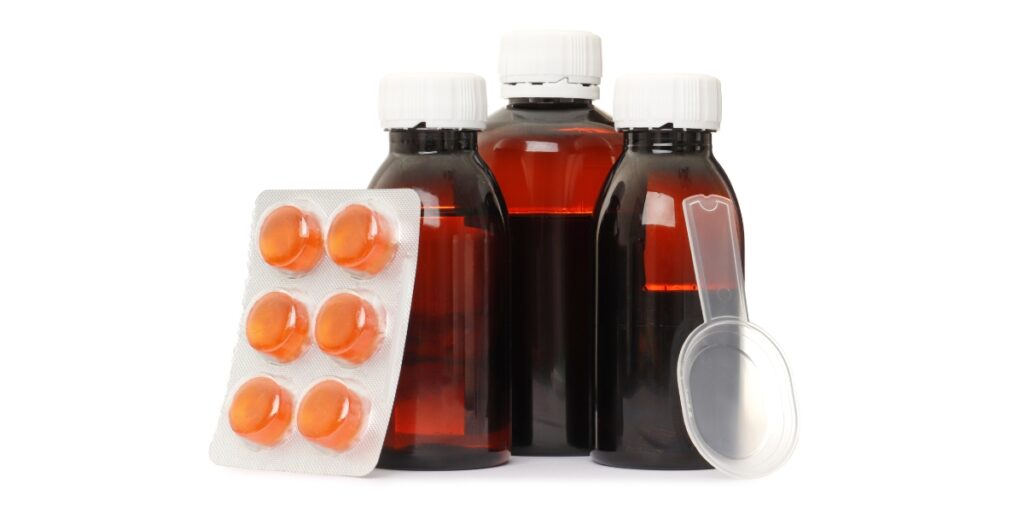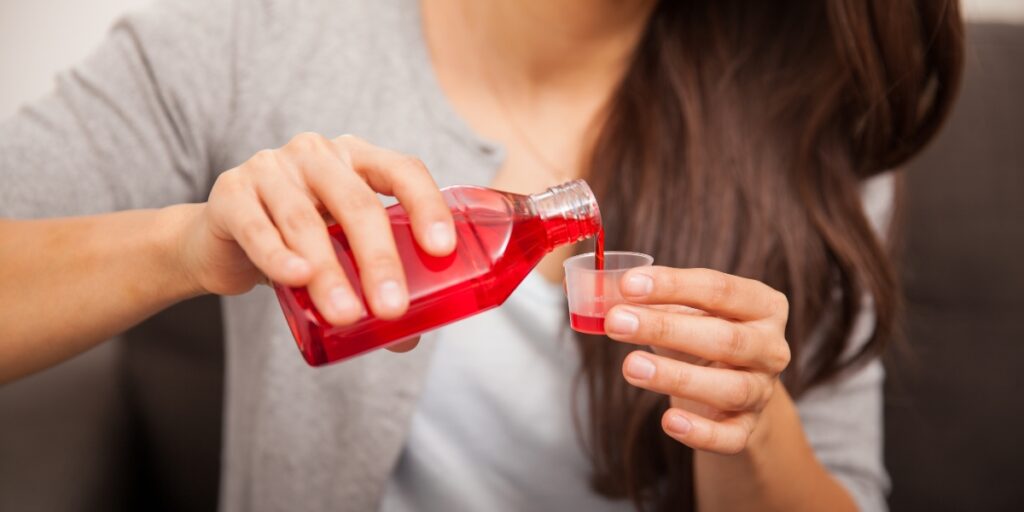Dextromethorphan (DXM) Abuse


While many people are aware of the dangers of prescription medications, few are aware of dextromethorphan (DXM) and the risks of DXM abuse. Most people who open their medicine cabinets will find more than one type of cough and cold medication that contains DXM. Dextromethorphan might sound like an obscure chemical or drug, but it is a common household item frequently abused by teens and young adults.
Dextromethorphan abuse is rising because of its availability and a mistaken belief that over-the-counter medications are less dangerous than their prescription counterparts. Further adding to the allure of DXM abuse is the pop culture phenomenon of mixing it with soft drinks and alcohol to mimic other dissociative drugs.
Learning the signs, symptoms, and risks of dextromethorphan (DXM) abuse can help prevent, recognize, and stop addiction.
What Is Dextromethorphan (DXM)?
Dextromethorphan (DMX) is a common ingredient in cough and cold medicines and cough syrups. DXM is a synthetic opioid derivative; however, it does not bind to the opioid receptors in parts of the brain or produce the same effects. In high doses, DXM has similar impacts to dissociative drugs like ketamine and PCP.
According to the National Institutes of Health (NIH), DXM has overtaken codeine as the most used cough suppressant, available in more than 140 cough and cold medicines. Dextromethorphan is not illegal to buy or sell, but some states require doctors or pharmacists to impose age restrictions and ID requirements on buyers to reduce the risk of abusing DXM.
Common brand names containing DXM include:
- Robitussin Cough Long-Acting
- Sudafed
- Delsym 12-hour Cough
- Vicks DayQuil Cough
- Mucinex DM
- Dimetapp Cold and Cough
- Theraflu Severe Cold and Cough
- Tylenol Cold and Cough
- Pediacare Children’s Cough and Congestion
When taken as prescribed, there is a low risk of side effects or drug interactions. The average medical amount for adults is 15 to 30 mg, lasting between four to 12 hours. If you forget to take it on schedule, skip the missed dose to avoid doubling up and experiencing unwanted effects of DXM, then resume taking the next dose at your usual time. Always keep medications, including DXM, out of reach of children.
Dextromethorphan Abuse
Dextromethorphan abuse is most common among teens and young adults. Teens are increasingly abusing DXM since it became common in pop culture and rap songs. Many people admitted they had abused DXM because it was readily available, cheap, and easy to hide.
The National Institute on Drug Abuse (NIDA) defines over-the-counter (OTC) cough medicine abuse as:
- Taking medicine in higher doses than directed
- Taking the medication with the explicit intent of getting high
- Mixing OTC cough medicine with alcohol or other drugs
Because DXM is legal, tracking usage outside emergency room visits and people seeking cough medicine abuse treatment isn’t easy. The Drug Enforcement Agency (DEA) reports that roughly 13.4 million DXM products sell annually. From 2016 to 2017, poison control centers reported 11,931 exposure cases, with teen abuse making up 8.9% of patients.
Signs of DXM substance abuse include:
- Appearing drunk or intoxicated without alcohol
- Empty boxes or bottles of cough medicine
- Faking colds, congestion, or coughing to explain using DXM
- Changes in sleeping habits
- Appetite changes
- Poor hygiene
- Tooth decay
- Worsening mental health
- Sweet or chemical-smelling breath
- Memory loss or discussing things that didn’t happen
- Sluggish reflexes and thought processes
Another reason cited by teens abusing DXM is self-medicating mental health conditions and symptoms with what they have available. It is not uncommon for adults to turn to drugs and alcohol to alleviate their problems, and teenagers mimic what they learn at home.
Mental health conditions alongside drug and alcohol abuse are co-occurring disorders and require a diagnosis. If untreated, addiction and mental health can spiral out of control. Access to proper mental health resources and conversations about healthy coping mechanisms can help reduce the risk of substance abuse.

Dextromethorphan Abuse Effects
Dextromethorphan abuse effects vary by dose, the person taking it, and other drugs and alcohol in the system.
The DEA has classified four different dose-dependent “plateaus” as follows:
- 100-200 mg—Mild stimulation and effects
- 200-400 mg—Euphoria and hallucinations
- 300 to 600 mg—distorted visual perception and loss of motor control
- 500 to 1500 mg—dissociative sedation
Other side effects of DXM can happen at dose, including:
- Drowsiness
- Dizziness
- Flushing or blotchy skin
- Nausea
- Vomiting
- Abdominal pain
- Dilated pupils
- Uncontrollable eye movements
- Slurred speech
- Loss of motor control
- Loss of balance
- Twitching
- Confusion
- Increased heart rate
- Vision changes
- Itching
- Depersonalization
- High blood pressure
- Respiratory depression
- Hallucinations
- Loss of consciousness
Drastic changes in breathing, body temperature, and heart rate can be signs of an overdose and must be taken seriously. Call 911 immediately if you believe an overdose is occurring.
Long-Term Effects
People who take cough medicine with DXM are at risk of long-term effects, even those who take it for medical purposes like chronic bronchitis or pneumonia. Abusing DXM increases the risk and severity of long-term side effects and health conditions.
Long-term effects include:
- Insomnia
- Muscle weakness
- Joint and bone pain
- Diarrhea
- Tooth decay
- Worsening mental health
- Anxiety
- Serotonin syndrome
- Liver damage
- Kidney damage
- Speech difficulties
- Memory loss
- Diminished motor control
- Seizures
- Withdrawal
Dextromethorphan and Alcohol
The intentional combination of dextromethorphan and alcohol is better known as lean or “purple drank.” Cough medicines with DXM are frequently flavored to mask the bitter taste, making them appealing to mix with alcohol and soft drinks and easy to swallow in high doses. Mixing DXM and alcohol is especially dangerous because most people don’t measure it, and they interact to enhance the effects of DXM to hazardous levels. The way of abusing DXM is extremely popular with teens and young adults.
Even when people don’t intentionally mix dextromethorphan and alcohol but perhaps have some drinks with a meal after taking their medications, there’s an increased risk of sedation and side effects that can result in overdose and complicated withdrawal symptoms.

Dextromethorphan Addiction Treatment
If you or a loved one are struggling with dextromethorphan addiction, help is available.
We provide compassionate, evidence-based, patient-centered care at White Oak Recovery Center for lasting recovery from substance abuse and co-occurring disorders. Our licensed, dedicated team of addiction professionals supports you during every step of your recovery journey— even after you walk out our doors.
Whether withdrawing from DXM or multiple drugs and alcohol, we can ensure your safety with onsite medical detox in a calm and supportive environment.
During your stay in our residential treatment center, we aim to uncover the roots of your addiction and replace them with healthy seeds of confidence, community, and a fresh outlook on life.
Reach out to our caring treatment specialists today.

Am I covered for addiction treatment?
Your insurance may cover treatment. Call now for an entirely free and confidential assessment. Recovery starts with a phone call.

- “Drug Fact Sheet: DXM.” United States Department of Justice, May 2020.
- “Dextromethorphan.” Drug Enforcement Agency, Apr. 2020.
- Martinak, Bridgette, et al. “Dextromethorphan in Cough Syrup: The Poor Man’s Psychosis.” Psychopharmacology Bulletin, vol. 47, Sep. 2017.
- May, Mary Elizabeth. “Dextromethorphan Abuse.” Poison Control National Poison Center, Jun. 2020.
- Oh SR, Agrawal S, Sabir S, et al. “Dextromethorphan.” National Library of Medicine, May 2022.
- “Dextromethorphan (DXM)” Oakland County Department of Health, Jan. 2022.
- “Dextromethorphan.” National Library of Medicine, Jan. 2022.
Medical Disclaimer:







